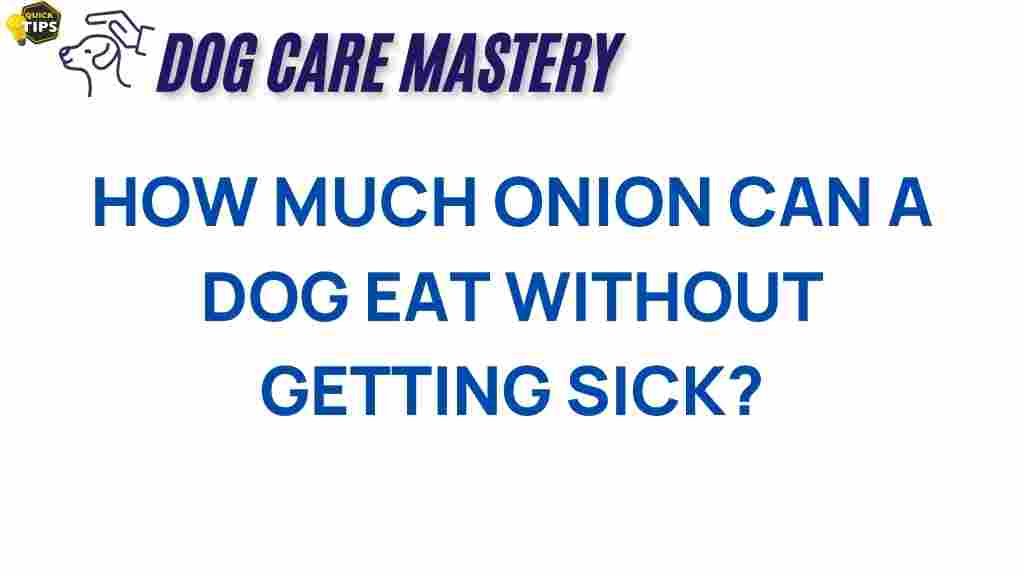Understanding Dog Health: The Onion Dilemma
When it comes to dog health, the foods we choose for our furry friends are crucial. Many dog owners often wonder about the safety of certain human foods, and onions are one of the items that raise red flags. While onions are a staple in many households, they can pose significant health risks to dogs. In this article, we’ll explore how much onion a dog can safely eat, the potential health risks, and what to do if your dog has ingested onions.
Why Are Onions Dangerous for Dogs?
Onions belong to the Allium family, which includes garlic, leeks, and shallots. These foods contain compounds that can be toxic to dogs, particularly thiosulfate. Unlike humans, dogs cannot effectively metabolize thiosulfate, which can lead to severe health problems.
Effects of Onion on Dog Health
- Hemolytic Anemia: This condition occurs when red blood cells are destroyed faster than they can be produced. Symptoms include weakness, lethargy, and pale gums.
- Gastrointestinal Distress: Dogs may experience vomiting, diarrhea, and abdominal pain after consuming onions.
- Increased Heart Rate: Anemia can lead to an increased heart rate as the body tries to compensate for the lack of oxygen in the blood.
How Much Onion Can a Dog Safely Eat?
When it comes to dog health, the answer is straightforward: zero. There is no safe amount of onion for dogs. Even small quantities can pose risks, especially if consumed regularly. The toxicity level can vary based on the size of the dog and the type of onion. Here’s a breakdown:
- Small Dogs: Even a small amount of onion can be dangerous. For example, just a few grams could lead to poisoning.
- Medium to Large Dogs: Larger dogs can tolerate slightly more due to their body weight, but it’s still not safe. A dog weighing 20 kg could start showing symptoms after consuming 100 grams of onion.
Types of Onions and Their Toxicity
Different types of onions can have varying levels of toxicity:
- Raw Onions: These are the most toxic and should be avoided entirely.
- Cooked Onions: Cooking does not eliminate the toxic compounds, so they remain harmful.
- Onion Powder: Often found in processed dog foods, onion powder is highly concentrated and very dangerous.
What to Do If Your Dog Eats Onion
If you suspect that your dog has consumed onions, it’s crucial to act quickly. Here’s a step-by-step process:
Step 1: Assess the Situation
Determine how much onion your dog has eaten and what type of onion it was. If your dog shows any symptoms such as vomiting or lethargy, it’s important to take action immediately.
Step 2: Contact Your Veterinarian
Always consult with a veterinarian when it comes to dog health. They can provide guidance based on the specifics of your dog’s situation. Be prepared to provide:
- Your dog’s weight.
- Type and amount of onion consumed.
- Time since ingestion.
Step 3: Follow Your Vet’s Advice
Your veterinarian may suggest bringing your dog in for an examination. They may perform blood tests to check for anemia or other health issues. In some cases, they may induce vomiting or administer activated charcoal to prevent further absorption of the toxin.
Symptoms of Onion Poisoning in Dogs
Being aware of the signs of onion poisoning can help in early detection. Look out for:
- Weakness and lethargy
- Vomiting and diarrhea
- Loss of appetite
- Pale gums
- Rapid breathing or increased heart rate
Prevention Tips for Dog Health
To ensure your dog’s health and well-being, here are some prevention tips:
- Educate Yourself: Know which human foods are safe and which are not. Resources like the ASPCA’s Animal Poison Control can provide valuable information.
- Avoid Table Scraps: Don’t feed your dog food from your plate, as it may contain harmful ingredients.
- Read Labels: Check the ingredients in commercial dog foods and treats to ensure they do not contain onion or onion powder.
Alternative Treats for Dogs
Instead of giving your dog onions, consider healthy alternatives:
- Carrots: A great crunchy snack packed with vitamins.
- Blueberries: A superfood that dogs usually love.
- Pumpkin: A good source of fiber and easy on the stomach.
Conclusion: Keeping Your Dog Healthy
In conclusion, when it comes to dog health, onions are a definite no-go. Understanding the risks associated with feeding your dog onions is crucial for maintaining their health and well-being. Always prioritize safe and nutritious foods for your canine companion and consult your veterinarian if you have any concerns.
Remember, prevention is the best approach. By keeping harmful foods out of reach and educating yourself on safe dog nutrition, you can help ensure your dog lives a long, healthy life. If you have any more questions about dog health, feel free to reach out to your vet or check out our other articles on safe dog diets here.
This article is in the category Health and created by dogcaremastery Team
